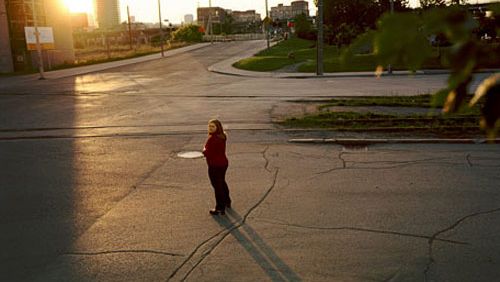"Why I Went AWOL"
She defends her decision to flee.

Kimberly Rivera spotted the little girl outside the U.S. military base in Baghdad. Just a tiny face in an agitated crowd. Saturday was "claim day," Kim explains, when Iraqi civilians would come to request compensation for things they'd lost in the bombings: Their furniture. Their jewelry. Sometimes their children. The Iraqis had to be checked by American soldiers. "We'd scan them, pat them down. Nobody ever had anything," says Kim, a former Army private.
Kim's soft Texas drawl snags in her throat as she remembers catching sight of the 2-year-old child of war with her family. The girl's dark eyes had locked on Kim. "She was just petrified," Kim says. "She was crying, but there was no sound, just tears flowing out of her eyes. She was shaking. I have no idea what had happened in her little life. All I know is I wasn't seeing her; I was seeing my own little girl. I could imagine my daughter being one of those kids throwing rocks at soldiers, because maybe someone she loved had been killed. That Iraqi girl haunts my soul."
And she changed Kim's life. The nameless child suddenly represented everything that felt wrong about being in uniform, about being in Iraq, for the 26-year-old former Wal-Mart clerk who had joined the military out of economic hardship, hoping to build a better future. Kim had two children and a husband waiting for her back home in Mesquite, TX.
Not long after that day at the Baghdad claims line in late 2006, Kim was on a two-week home leave. But even in the welcoming embrace of her small family, she couldn't let go of the pent-up tensions of the war zone. "I was so crazy, like a roller-coaster car that goes off its tracks and crashes," she says. "Sometimes I'd be pacing or paranoid or a little panicked. Other times, it would be just extreme depression." Kim's thoughts constantly turned to her kids. "It was incredibly emotional. I kept thinking, What if something happened to them? What if there was some emergency and they were hurt? I wouldn't be there for them," she says. "I'd be over in Iraq, just waiting to die."
The possibility of running away didn't occur to Kim at that point. But it did to her husband, Mario. He retreated to his computer, his usual hideout in times of stress. This wasn't the shy, sweet Kim he had known as a teenager; they couldn't go on like this. So Mario began researching antiwar groups and stumbled across the War Resisters Support Campaign in Canada. He sent an e-mail asking if anyone there could help. A former Vietnam War deserter named Lee Zaslofsky responded: Yes.
"The first time Mario told me, I dismissed it," Kim says. "What were we going to do in Canada?"
She remembers Mario pleading with her, "What options do we have?"
Get exclusive access to fashion and beauty trends, hot-off-the-press celebrity news, and more.
"We don't have any options," Kim snapped.
"Well, this is an option," he pressed. "It's better than none."
Kim was due to report to her base in a few days to travel back to Baghdad. With the deadline approaching, she and Mario piled the kids and everything else they could fit into the family's blue Geo Prizm, uncertain when they pulled out of the driveway whether they were heading for the base — or for the border.
Kim was a wreck. They drove in a huge multistate circle for days, zigzagging west to east, north to south, debating and crying. "I could not make up my mind," Kim says. "And I was getting paranoid. We only used cash. Some hotels wouldn't take cash, so we'd have to find ones that did. I kept thinking that the police were going to break down our door in the middle of the night and find me." Kim thought about her life in the Army before Iraq, when she worked a simple 9-to-5 day, driving supplies from one place to another, packing up trucks, and unloading equipment from train boxcars. Now every time she heard a car door slam, she says, "it sounded like a faraway mortar."
She and Mario finally pointed the car north. On February 18, 2007, they crossed the border.
America disappeared fast in the mist of the Rainbow Bridge at Niagara Falls. Kim was too numb, too angry, to look back. One minute she was Private Kimberly Rivera, a soldier, an Iraq War veteran, and an avowed patriot. But when she left the country that winter day, unnoticeable in the crush of honeymooners and sightseers, Kim became something else: a deserter.
One of more than 16,000 American soldiers who have gone into hiding rather than fight since the U.S. invasion of Iraq five years ago, Kim belongs to a small but growing movement of deserters seeking refuge in Canada, hoping to be granted citizenship the way American draft dodgers were during the Vietnam era. But this war is different. Soldiers aren't drafted like they were for Vietnam, and Canada no longer has the open-door policy it had for that generation's protesters.
Kim and an estimated 200 fellow deserters who fled north now live in uncertain exile, unable to return to their old lives or to begin anew; they're wanted on a fugitive warrant from the U.S. military and not openly welcomed by the Canadian government. They have been able to stay in Canada while they work their way through the court system — seeking political asylum or permission to immigrate — but so far, the courts have ruled against them. At press time, one soldier, Robin Long, had been deported to the U.S. and sentenced to 15 months in jail. Others are expected to follow.
As for Kim, she has been denied refugee status and is now appealing. Separately, she is also asking to stay in Canada on humanitarian grounds. Final rulings are expected by year's end.
When we meet in her subsidized apartment in a working-class Toronto neighborhood, Kim shyly opens the door to reveal a bare living room with a used dining-room set. She and Mario share the only bedroom with their kids, 6-year-old Christian and 4-year-old Rebecca. "It's cozy to be able to reach out and touch them and feel safe," Kim says.
Kim used to speak to her family daily from the war zone. Soldiers were allowed free phone calls in 15-minute turns, but Kim would go back when everyone else was sleeping to talk to Mario. One night, she returned from such a call to find an inch-long piece of shrapnel on her bunk. That could have hit me in the head and killed me, she thought.

Kim doesn't mind her spartan life in Toronto; poverty is something she has always known. "I never had any money growing up," she says of her childhood in Mesquite. Kim met Mario as a teen at the Wal-Mart, where they both worked. They'd dreamed of a future with educations and real careers, but Kim became pregnant at 20, and another baby quickly followed. She and Mario lived with Kim's parents, whose dislike of Mario made the situation unbearable.
Kim and Mario got married, and she saw the military as her only option. Becoming a soldier would mean a steady income, benefits, a roof over their heads. "Mario wanted to go instead of me," she says, but both were overweight, and Kim thought she would be able to shed the necessary pounds more quickly.
In January 2006, Kim joined the Army, and the family was posted to Colorado, where Kim was trained as a truck driver. The $8,000 signing bonus seemed like a fortune. Kim bought a tan sofa and chair ("microfiber suede," she says proudly), plus a TV and toys for the kids. Then her orders came for Iraq. "When they told me I'd be carrying a 20-pound semiautomatic weapon, it hit home," she says. "I felt like they were telling me I wasn't coming back."
Kim shipped out October 3, 2006, to a base in Baghdad. Meanwhile, her husband and kids moved back to Mesquite. In Iraq, Kim's main job was to guard the front gate of her base, inspecting vehicles and military convoys. There was an old supermarket across the street. "I was always afraid of that building," she says, "because there were these narrow windows throughout, and it would be completely easy for a sniper to hide there."
By the time Kim had deployed, the fruitless search for weapons of mass destruction was long over, and her purpose, she believed, was to help the Iraqis rebuild and to deliver America's promise of freedom and democracy. Once there, however, Kim could see nothing but lies. "I felt like my government had betrayed me," she says.
After the Riveras crossed the border, Kim turned on her cell phone to find her voice mail filled with stern warnings from her commanding officers. However, Army spokesmen say the military doesn't actively pursue deserters; only 897 deserters have been prosecuted since the Iraq War began, and about half have pleaded guilty to AWOL rather than face trial. While desertion carries a five-year prison term, punishment for going AWOL is a maximum of 18 months. Both charges can include less-than-honorable discharges, or "rehabilitation" back at the unit.
Today in Toronto, Kim, who is due to give birth this month to her third child, works a night shift in a bakery, thanks to a temporary work permit. Mario works at a McDonald's during the day. Kim misses Mesquite, as well as her parents, who don't support her decision.
During my visit, Kim kisses Mario, a lumbering teddy bear of a guy, three times before leaving the apartment for an hour. Then she smiles and tells me, "He's my euphoria." Later, she hurries down the street on her way to a favorite doughnut shop that reminds her of one back home in Texas. A homeless woman approaches and asks for change.
"Sorry, dear," Kim apologizes, offering directions to a government-run food pantry instead. It's been a while since Kim has had to get groceries at the pantry herself, but when she heard the local government was about to close it down, she joined the campaign to save it. Becoming a war resister has awakened the activist in her. She still keeps her fatigues, which she wears sometimes for antiwar rallies, and dreams of doing "something humanitarian" someday.
That evening over a take-out dinner, Kim's kindergartner, Christian, suddenly puts down his pizza to announce, "My mommy was a soldier. She had to make a choice: Go home or die." Kim freezes midbite, her eyes widening. Christian prattles on. "She chose to come home to her family. She didn't want to die. Her job was guarding the gate. Now someone else does it."
Kim is still sitting at the dinner table a half-hour later, wondering how her son had absorbed so much, when there's a sharp knock at the door. A man's voice rings out: "Kimberly Rivera!" Kim and Mario exchange frantic looks. Is this it? Is she going to be led away in handcuffs? Mario tentatively opens the door. The stranger hands him a boxful of donated toys for the kids — gifts from a local charity. Flooded with relief, Kim simply says, "Thank you. Thank you so much."
Tamara Jones is a former Pulitzer Prize-winning reporter for The Washington Post.